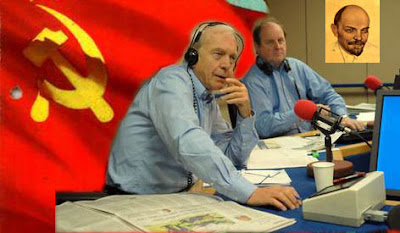a leader article in the Daily Telegraph, Winds of competition:
Not entirely unlike the Royal Mail farrago is the crisis that looms at the BBC. Again, a public sector organisation faces threats of strike action from its unions that could weaken the future of the entire enterprise. But in this case, the decisions of the management seem to be dictated by an irrational bureaucratic mindset.
The corporation has set its face against closing down the little-watched digital channels BBC3 and BBC4, preferring to cut the most distinguished of the BBC’s core services: news and current affairs, and factual programming. To attack the most publicly esteemed areas of its production — rather than admit defeat in its failed experimental ventures — reveals a bizarre system of priorities that takes no account of the logic of market forces. But neither the BBC nor Royal Mail exists in a non-competitive vacuum any longer. They will need disciplined realism if they are to survive among the choices that new technologies offer.
My own view is that there’s a lot of managerial girth at the BBC that should be addressed first – almost two years ago Media Guardian reported Surge in BBC’s top earners, with the news that, at that time, 262 BBC staff took home more than £100,000 per annum as salary – more than 1% of those on the corporation’s payroll, not to mention the large numbers of highly paid individuals hovering below £100,000pa. Needless to say, the BBC defended itself at the time with this old chestnut:
The BBC said that it needs to pay big salaries to attract the best staff and also attributed much of the rise to inflation.
– the same specious argument that was put forward to justify the utterly ridiculous sum of £18m over three years paid to Jonathan Ross. If he can get that much from ITV or anyone else then good luck to him. There are plenty of talented people who’d be honoured to replace Woss for a fraction of that amount.
BBC Three probably should go – the few good bits can easily find new homes, the rest, mostly race-to-the-bottom dross (I love the C-word anyone?) that does nothing for our nation deserves to disappear – certainly from the tellytaxpayer teat. BBC Four should probably stay – it is much closer to the BBC’s public service remit (and is half the cost of BBC Three).
Today’s Daily Mail covers this story at greater length, BBC News and Top Gear face cuts as corporation is forced to axe 3,000 staff:
BBC insiders are mystified that their bosses appear to be targeting areas which are the cornerstone of the corporation’s public service remit.
John Humphrys, among others, has said Mr Thompson should kill off less popular services such as BBC3, rather than slash news and current affairs.
But the BBC seems determined to hold on to the controversial channel, which costs licence fee payers £116million a year.
BBC3, aimed at younger audiences, spends almost £180,000 an hour on its programmes, double what BBC1 spends.
Yet it gets just two per cent of viewers or a tenth of BBC1’s figures.
The channel has also been criticised for lurid programme titles like F*** Off I’m a Hairy Woman and Sex Talk With Mum and Dad.
The Mail also quotes Conservative MP John Whittingdale, chairman of the Commons culture, media and sport select committee, accusing Mark Thompson, Director General of the BBC, of contradicting his previous statements about wanting to protect quality programming: “He is cutting jobs in the precise areas where there is the greatest need for public service content and where the BBC’s strength lies. They are doing precisely what Mark Thompson said they would not do”.
I have no sympathy for the BBC’s pleas of poverty – a guaranteed £3.5 billion pounds annual income is a lavish amount for any broadcaster, but it is ridiculous that the BBC’s management are threatening genuine public service aspects of the BBC whilst busily expanding the BBC in all sorts of non-core areas, producing all sorts of tosh that could and should be produced more economically by commercial broadcasters.
It’s unusual for Biased BBC to defend (some parts of) the BBC, but it looks as if we’re set to end up with the worst of both worlds – more ratings chasing dross and less quality public service broadcasting – and this from Mark Thompson, who as chief executive of Channel 4 described the BBC as “basking in a Jacuzzi of spare public cash“, claiming that he would produce a stronger BBC that “spent less on process and more on content”.
See also yesterday’s ongoing complaint and comments about the selectivity of what counts as BBC in the news on the BBC Editors Blog.




